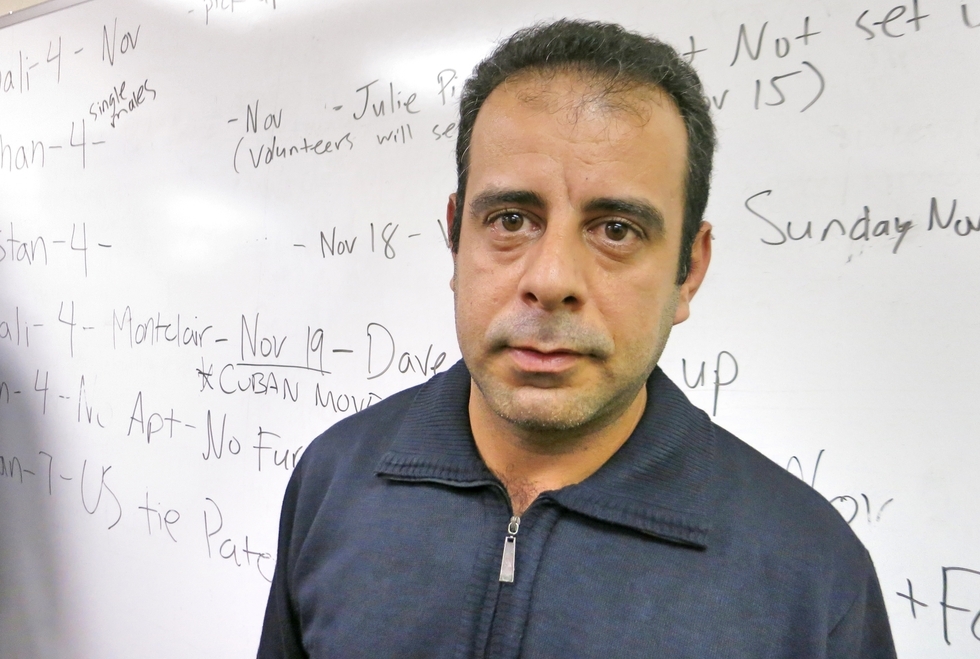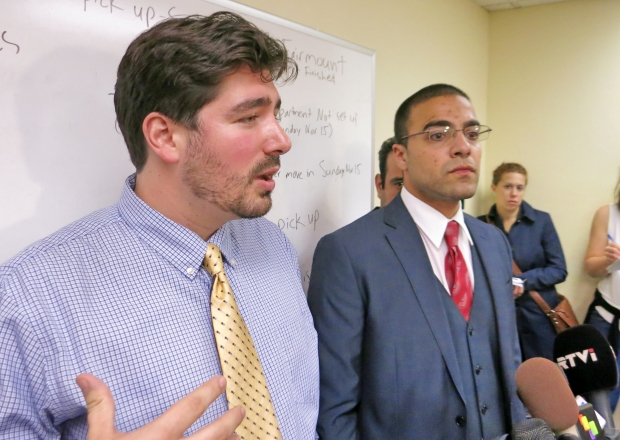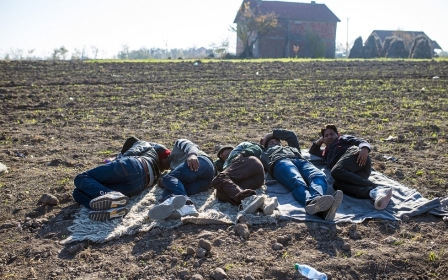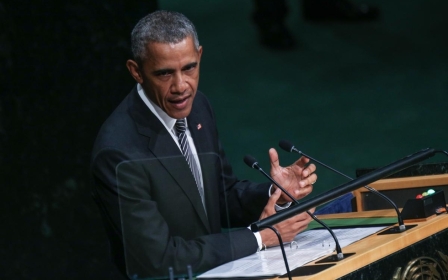US refugee groups vow to welcome Syrians despite terrorism fears
A group that settles Syrian refugees in the US vowed to continue welcoming arrivals, despite efforts by Republican lawmakers

Hussam al-Roustom, a Syrian refugee resettled by Church World Service, speaks to reporters in Jersey City (MEE/James Reinl)
Published date: 20 November 2015 11:03 GMT
|
Last update: 9 years ago
JERSEY CITY, United States – A support group for refugees vowed to continue welcoming Syrians to the United States on Thursday, despite efforts by right-wing politicians to halt new arrivals amid fears of terrorism in the wake of the Paris attacks.
“We’re going to continue assisting these people, on the ground, because we believe in the work that we’re doing,” Will Haney, a spokesman for Church World Service (CWS), which resettles refugees across 21 American states, told Middle East Eye.
“We believe that refugees are the most vetted population that arrives here in the United States and we’re confident that they’re not a threat to this country but a help to communities here in New Jersey and around the US.”
He spoke against a tense backdrop, after some 27 state governors voiced opposition to new Syrian refugee arrivals and as lawmakers voted to intensify security screenings and suspend US President Barack Obama’s programme to admit 10,000 Syrian refugees in the next year.
Chris Christie, New Jersey’s Republican governor and a presidential hopeful, said this week that he did “not trust this administration to effectively vet the people who are proposed to be coming in”. He even ruled out admitting orphaned Syrian toddlers.
On Thursday, the US House of Representatives, defying a veto threat from Obama, overwhelmingly passed Republican-backed legislation against Syrian refugee arrivals in response to the Islamic State (IS) attacks in Paris last Friday that killed 129 people.
Some people say that refugees could be undercover militants bent on attacking the US, noting reports that at least one Paris attacker may have slipped into Europe among migrants registered in Greece.
The measure now goes to the US Senate, which is similarly controlled by Republicans, although their majority in the upper house is slimmer. Both houses would require a two-thirds majority to override Obama’s veto.
Under the proposal, no refugees from Iraq or Syria could enter the US until several top-level US security officials personally vouched they did not pose a threat. Refugees are already screened by experts from multiple agencies in a process that can drag on for years.
The White House said the bill would introduce “unnecessary and impractical requirements” that would hamper US efforts to help some of the world’s most vulnerable people without doing anything to make Americans safer.
Earlier this week, a State Department official said that state governors, such as Christie, did not have the power to overrule federal government programmes, or stop a refugee who arrived legally in one state from travelling to another.
“While state and local governments have an important consultative role to play in the resettlement of refugees, the resettlement programme is, as you’re hearing, administered by the federal government,” the official told reporters, speaking on background.
In Jersey City, Mahmoud Mahmoud, director of the area’s CWS refugee centre, described “business as usual” as colleagues had welcomed new arrivals almost daily this week. State governor Christie was getting bad advice, he added.
“I think the governor should be more informed about the information he’s being provided,” Mahmoud told MEE. “Five intelligence agencies work in tandem with one another to properly vet these refugees before they ever arrive to the US.”
One Syrian refugee who was resettled by the centre, Hussam Alroustom, urged US lawmakers and similarly-anxious European politicians not to shut doors to Syrians over fears of another Paris-style strike.
“It’s quick to just paint a brush over the whole Syrian population – people who didn’t have anything to do with what happened,” he told journalists, speaking through a translator, during a packed press conference on Thursday.
“The Syrian people are not terrorists at all. The person who is fleeing from Syria is fleeing from war, for a better life and opportunities. I hope the international community and countries don’t make quick decisions and look at all their options first.”
Alroustom fled from Syria in March 2013 after his home city of Homs was torn apart by missiles and shells fired by Syrian President Bashar al-Assad’s forces. He lost his house and his supermarket and metalworking businesses.
He described “extremely difficult conditions” in Jordan’s refugee camps, including a lack of water, electricity and medicine for his children. He applied for refugee status and was accepted into a US programme that saw him interviewed dozens of times for more than a year, he said.
He reached the US in June. He now works in a bakery and lives in an apartment in New Jersey with his seven-year-old autistic son and his four-year-old daughter. The rest of his family has been torn apart by Syria’s civil war, which has claimed more than 250,000 lives.
“My life has changed. I came from a tight, congested place to a country that has welcomed me with open arms,” Alroustom said. “My children went without school or parks or their childhood for four years. Now we have a breath of freedom.”
Campaigners responded angrily to the House bill against Syrian refugees. Maya Berry, executive director of the Arab American Institute, a Washington-based lobby group, urged lawmakers not to abandon American values.
“The reality is, our procedures and policy for vetting refugees are tested and sound,” Berry told MEE. “Xenophobic anti-Muslim and anti-Arab bigotry are part of what is driving this conversation now and that must be part of what we tackle too.”
Michael McCaul, Republican chairman of the House Homeland Security Committee, defended the bill, saying it would create “the most robust national security screening process in American history for any refugee population”.
The document “strikes an important balance between security and our humanitarian responsibilities. It sets up roadblocks to keep terrorists from entering the US while also allowing legitimate refugees who are not a threat to be resettled appropriately,” he said.
New MEE newsletter: Jerusalem Dispatch
Sign up to get the latest insights and analysis on Israel-Palestine, alongside Turkey Unpacked and other MEE newsletters
Middle East Eye delivers independent and unrivalled coverage and analysis of the Middle East, North Africa and beyond. To learn more about republishing this content and the associated fees, please fill out this form. More about MEE can be found here.





